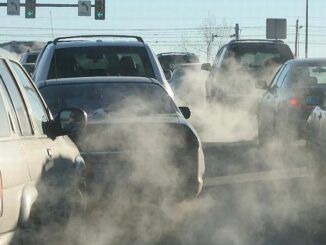
WASHINGTON, DC, September 15, 2020 (ENS) – The U.S. and California governments have proposed a settlement with German automaker Daimler AG and its American subsidiary Mercedes-Benz USA that would resolve alleged violations of the Clean Air Act and California law associated with diesel emissions cheating in about 250,000 cars and vans.
The proposed settlement with the U.S. Environmental Protection Agency (EPA), the U.S. Department of Justice, and the California Air Resources Board (CARB) was lodged on September 14 in Washington, DC with the U.S. District Court for the District of Columbia. It requires Daimler to recall and repair the emissions systems in Mercedes-Benz diesel vehicles sold in the United States between 2009 and 2016.

The settlement covers approximately 250,000 light- and medium-duty diesel vehicles; these are passenger cars and Sprinter vans from model years 2009-2016.
Daimler and Mercedes-Benz must pay $875 million in civil penalties and roughly $70.3 million in other penalties. The civil penalty of $875 million is the second-largest civil penalty in the history of the Clean Air Act.
The company will also extend the warranty period for certain parts in the repaired vehicles, perform projects to mitigate excess ozone-creating nitrogen oxides (NOx) emitted from the vehicles, and implement new internal audit procedures designed to prevent future emissions cheating.
NOx emissions from vehicles play a key role in ground-level ozone production and negatively impact human health, the EPA said. Breathing ozone can damage lung tissue, worsen heart disease and lung conditions like asthma, emphysema, and bronchitis.
The recall program and federal mitigation project are expected to cost Daimler about $436 million. The company will pay another $110 million to fund mitigation projects in California. Altogether, the settlement is valued at about $1.5 billion (€1.27 billion).
“The message we are sending today is clear. We will enforce the law. We will protect the environment and public health. And if you try to cheat the system and mislead the public, you will be caught,” said U.S. EPA Administrator Andrew Wheeler. “Those that violate public trust in pursuit of profits will forfeit both.”
Daimler denies the authorities’ allegations as well as the class action plaintiffs’ claims and does not admit any liability to the United States, California, plaintiffs, or otherwise.

The settlement resolves the company’s pending civil proceedings with the U.S. authorities without reaching any determinations as to whether functionalities in Daimler’s vehicles are defeat devices. By concluding the proceedings, Daimler said in a statement, the company “avoids lengthy court actions with respective legal and financial risks.”
Vehicle manufacturers are required by the Clean Air Act and federal regulations to apply for and receive a certificate of conformity from EPA before selling a new model year vehicle in the United States. Manufacturers must demonstrate that a vehicle meets emissions standards and disclose to EPA all auxiliary emission control devices (AECDs) and any defeat devices installed in the vehicle.
This settlement addresses allegations made in separate civil complaints filed by the United States and CARB on September 14, 2020, that, from 2009 to 2016, Daimler manufactured, imported, and sold more than 250,000 diesel Sprinter vans and passenger cars with undisclosed AECDs and defeat devices programmed into the vehicles’ complex emissions control software.
The defeat devices cause vehicles to produce compliant results during emissions testing. But when not being tested, the emissions controls can perform less effectively, resulting in an increase in NOx emissions above compliant levels.
The federal and state agencies discovered the defeat devices in Daimler’s vehicles in the wake of the Volkswagen emissions cheating scandal through testing conducted at the National Vehicle and Fuel Emissions Laboratory in Ann Arbor, Michigan and at CARB’s testing laboratory in El Monte, California.
In April 2017, a U.S. federal judge ordered Volkswagen to pay a $2.8 billion criminal fine for “rigging diesel-powered vehicles to cheat on government emissions tests.” As of June 1, 2020, the scandal had cost VW $33.3 billion in fines, penalties, financial settlements and buyback costs.
The Daimler settlement requires the company to implement a recall and repair program to remove all defeat devices from the affected vehicles at no cost to consumers and bring the vehicles into compliance with emissions standards under the Clean Air Act.
CARB Chair Mary Nichols said, “Californians live with some of the worst air in the country, air that adversely impacts public health causing or contributing to asthma, respiratory disease, and premature death. It also costs the economy through medical costs as well as lost work and school days.”
“Automakers must learn that in this state,” said Nichols, “CARB will continue to use the very latest and most sophisticated science and technology to catch cheating and violations that impact our air and health.”
To avoid stiff penalties, Daimler must repair at least 85 percent of the affected passenger cars within two years and at least 85 percent of the vans within three years.
Daimler must also replace 15 old locomotive engines with new, less-polluting engines to offset the excess NOx emitted from its vehicles.
The proposed settlement is subject to a 30-day public comment period and court review and approval. Copies of the consent decree lodged with the court are online here.
Copyright Environment News Service (ENS) 2020. All rights reserved.



